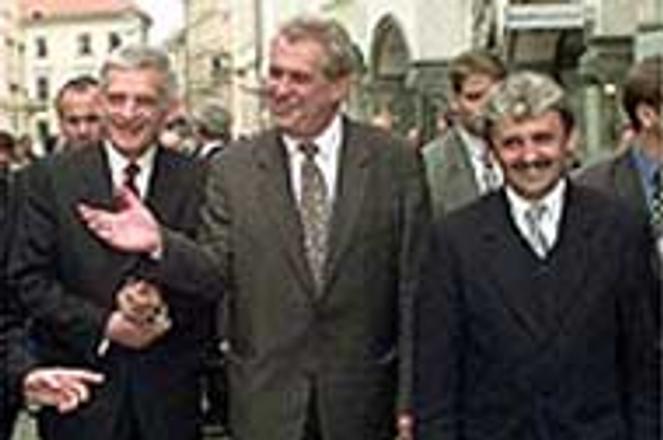The V4 prime ministers of Hungary, Poland, the Czech Republic and Slovakia (from left) met in Bratislava May 14.photo: TASR
On what Prime Minister Mikuláš Dzurinda deemed "an historic day for Slovakia and an historic day for the whole region," the prime ministers of Poland, the Czech Republic, Hungary and Slovakia met for the first time May 14 since the founding of the Visegrad 4 organization in 1991.
The summit, which took place in Bratislava, provided the four leaders with the opportunity to re-affirm their commitment to broad-based regional cooperation and also gave the leaders of the three stronger central European nations the chance to proclaim their support of Slovakia's EU and NATO ambitions in the strongest of terms.
In a clear slight to former prime minister and presidential candidate Vladimír Mečiar, the Polish, Czech and Hungarian prime ministers spoke of the past few years as lost time for Slovakia and welcomed the country, under the leadership of Prime Minister Dzurinda, back to the company of nations.
"I congratulate the citizens of Slovakia for the success they have achieved today. Today the citizens of Slovakia are facing a new future. I would also like to congratulate Prime Minister Dzurinda for this effort to return Slovakia back to the road to integration and make it a respected figure among nations," said the Prime Minister of Hungary, Viktor Orbán.
"We were waiting impatiently for this fourth reserved chair to be occupied again, and we are happy to see it occupied by Slovakia again," said Polish Prime Minister Jerzy Buzek. "This summit affirms that our four nations share a common future."
The prime ministers also stated that what they most wanted to work on was action: real projects of cooperation in fields from education to energy diversification which could jointly ease the countries closer to EU compliance. In that vein, the prime ministers issued a seven-point joint statement which set out some common aims for cooperation.
According to the approved document, the Visegrad countries will work together in the fields of foreign affairs, internal affairs, education, culture, society, youth and sport, science and technology, infrastructure, cross-border co-operation, and the environment. Non-governmental organizations in the various countries should be encouraged to work together and communicate, the statement reads.
While short on details, the joint statement stressed the need to promote cooperation in the fight against illegal migration, trafficking of people illicit drugs and weapons, as well as in combating international crime and terrorism.
The communiqué also indicated the desire of the four nations to meet twice annually, once formally, and once informally. The first informal meeting, they announced, would take place in the High Tatras in October, and be followed by an official meeting in the Czech Republic next year.
"We are looking forward to the official meetings with ties and the unofficial meetings without ties," punned Czech Prime Minster Miloš Zeman.
The four also adopted a joint statement on the Kosovo crisis, which, which stating sympathy for all who are affected by the crisis, affirmed their NATO support. "We call upon the authorities of the Federal Republic of Yugoslavia to comply with all conditions set forth by NATO and other international organizations and countries to ensure a verifiable stop to all military actions and the immediate end of all forms of violence," the statement read.
"We mustn't overlook killing, sending out and raping of the people. NATO actions absolutely fit into basic Christian ideas," Orbán added.
Importantly, the ministers referred to the V4 not as an alternative international structure to the EU, but rather as a group through which they could speed their entrance into the European community. As the weakest link in the chain, Slovakia should receive special support from the other nations in this regard, the prime ministers said, although, again, they did not give details.
"The most important objective (of the V4) is to help each other to become part of the integration process," Orbán said.
Speaking at the summit press conference, Dzurinda was evidently pleased by the support, thanking the other prime ministers. But he added, "Full membership for NATO is really in our hands. I appreciate that the other three are here, but Slovakia itself must provide the reason for the petition."
At its founding in 1991, Visegrad group consisted of three countries, Poland, Czechoslovakia, and Hungary. After the division of Czechoslovakia in 1993, however, the alliance stagnated, in part due to the "divergence from traditionally accepted values...of the transformation of society" by Slovakia, reads an official statement from the summit.
Author: Daniel Gurlowitz

